
Hard-boiled eggs should have a firm yolk and white. If not, they haven't been cooked properly. If your eggs have a soggy, runny yolk in the middle, all they need is a bit more time to cook so you can add them to your egg salad or any other dish you would like. With a bit of practice, you'll know exactly how long to cook your eggs in the future.
An Egg-ceptional Mystery
Cooking perfect hard-boiled eggs takes time and practice, especially because there's no way to peer inside the shells of your eggs to see if they are fully cooked. Generally, you'll need to boil your eggs, completely submerged in a single layer, for at least eight minutes to fully cook both the inside and outside of them, recommends the Fine Cooking website. Cooking them for less than this amount of time will result in either a soft- or medium-boiled egg with a runny or somewhat soggy yolk. Overcooking your eggs for much longer than eight minutes can result in hard-boiled eggs with a green or somewhat gray ring around the yolk.
Don't Run Away from Your Runny Eggs
If your hard-boiled eggs are slightly soggy, but not runny in the middle, you don't have to discard them. Instead, heat your peeled eggs, cut in half, in your oven at around 325 degrees Fahrenheit for a few minutes, wrapped in aluminum foil, until the yolks are firm to the touch. You can also poke a food thermometer through the top of the shell to test the inside temperature of your eggs. If the temperature is at least 160 F, then your eggs are hard-boiled; if not, then bake them in their shell at 325 F until fully cooked. Never microwave your eggs in their shells to finish cooking them because they can explode.
Nobody Likes Baby Sitting Hard-Boiled Eggs
Rather than stand around your oven waiting for your eggs to finish cooking, you can cook your eggs to hard-boiled perfection without having to worry about over- or under-cooking them. Simply place your eggs in a pot filled with enough water to cover them, and bring it to a rolling boil. Cover the pot and remove it from the heat. Let the pot sit for between 14 and 17 minutes to fully cook your eggs, avoiding a soggy middle, recommends the American Egg Board website. This method won't overcook them because the water only boils for a short amount of time over direct heat. In high altitudes, you'll need to first simmer the eggs for five minutes before covering them.
Should I Eat Soggy Eggs?
If your "hard-boiled" eggs are soggy in the middle, they're actually medium-boiled and you can eat them this way if you desire -- but the U. S. Department of Agriculture warns that eggs that aren't firm in the middle may contain harmful pathogens, such as salmonella. Refrigerate your hard-boiled eggs for up to one week. To avoid any issues with the timing or cooking of your eggs, you can purchase devices to cook eggs perfectly, whether you want them soft-, medium- or hard-boiled. These egg cookers actually steam the eggs rather than boil them.
Related Articles
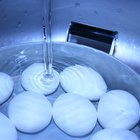
How to Overcook Hard Boiled Eggs

How to Make Your Deviled Eggs Look Great

How to Cook a Hard Boiled Egg With a ...
How to Keep Yolks in the Center of Hard ...
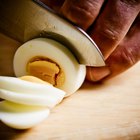
How to Prevent Dark Circles in Hard ...

How Are Egg Sizes Determined?

How to Cook Eggs in Cupcake Pans
How Long After I Cook Hard-Boiled Eggs ...
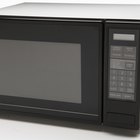
How to Cook Eggs With a Microwave ...

What Does It Mean if a Boiled Egg Turns ...
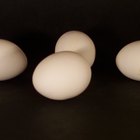
How to Boil Organic Eggs
How to Fry an Egg Without It Turning ...

How to Preserve a Hard Boiled Egg

Calories of Egg Whites Vs. Whole Eggs
How to Cook Over-Easy Eggs in a ...
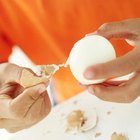
Should I Pierce Eggs Before Boiling?

Nutrition Facts of Eggs Over Easy

Does Lemon Juice Help Keep Raw Eggs ...

How to Cook Eggs Sunny Side Up Without ...
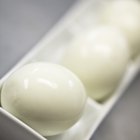
What Causes a Green Ring Around the ...
References
Resources
Writer Bio
Based in Las Vegas, Susan Paretts has been writing since 1998. She writes about many subjects including pets, finances, crafts, food, home improvement, shopping and going green. Her articles, short stories and reviews have appeared on City National Bank's website and on The Noseprint. Paretts holds a Master of Professional Writing from the University of Southern California.
Photo Credits
Jupiterimages/Goodshoot/Getty Images